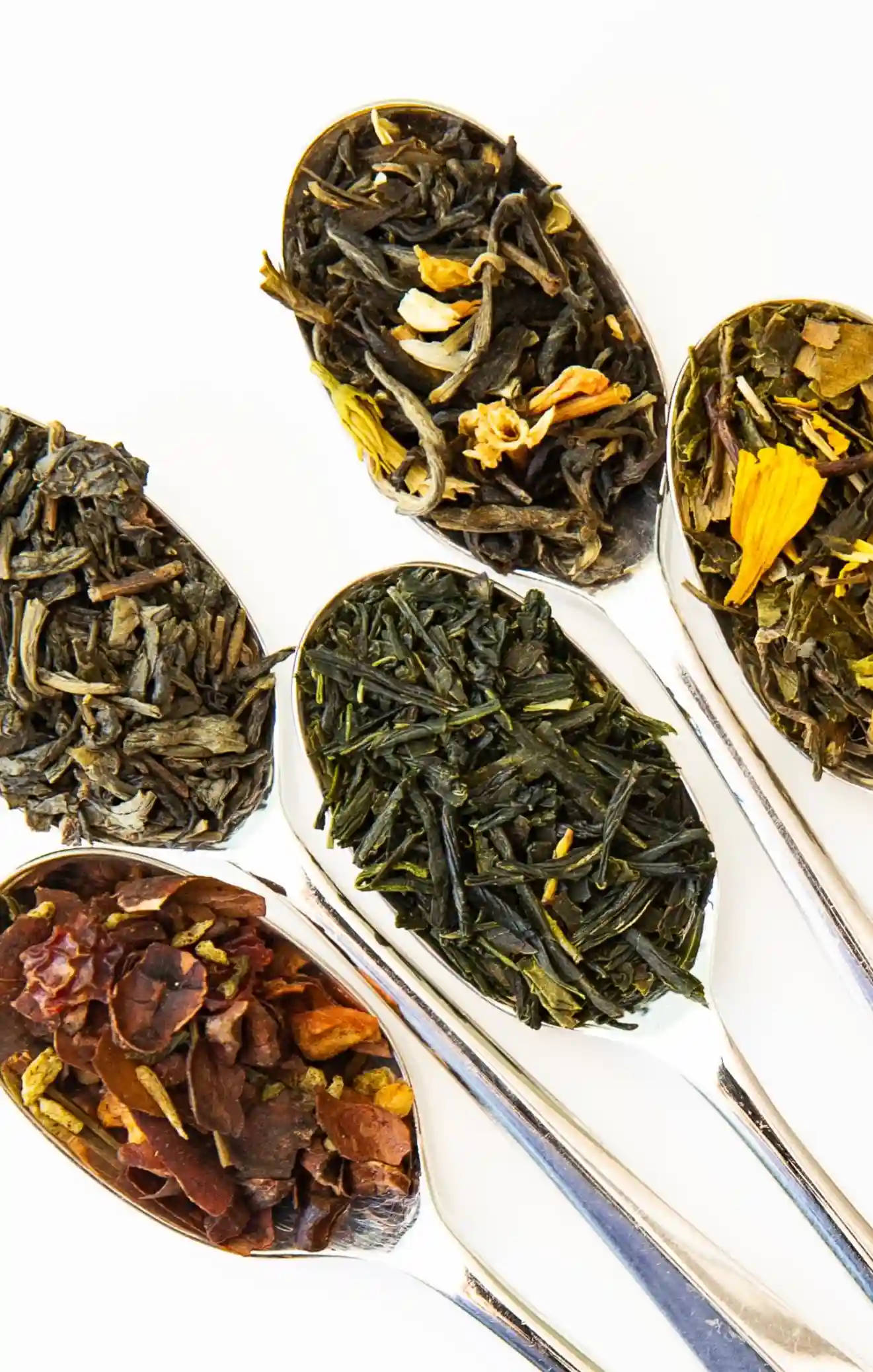Did you know that rooibos tea is gaining popularity as a delicious and healthy drink across the globe? This herbal tea, consumed in southern Africa for centuries, is now beloved for its numerous health benefits. In this article, we will explore the potential of rooibos tea to promote natural wellness and uncover its surprising advantages.
Key Takeaways
- Rooibos tea is an herbal beverage rich in antioxidants, offering potential health benefits.
- It is caffeine-free and low in tannins, making it a great alternative to black or green tea.
- Rooibos tea may help boost heart health.
- It’s reputed to both reduce cancer risk and may benefit people with type 2 diabetes.
- While generally safe, some people may experience allergies or sensitivities.
- Moderation is advised for those prone to kidney stones due to low oxalic acid content.
- Monitor blood sugar levels closely if diabetic due to potential blood sugar-lowering effects.
- Consult a healthcare professional before dietary changes, especially with underlying health conditions.
What is Rooibos Tea?
Rooibos tea, also known as red tea or red bush tea, is a herbal tea made from the leaves of a shrub called Aspalathus linearis. Unlike black or green tea, rooibos tea is not derived from the Camellia sinensis plant. This caffeine-free beverage has gained popularity for its unique flavour and potential health benefits.
Let’s take a closer look at what makes rooibos tea so special:
- Traditional Rooibos Tea: Traditional rooibos tea undergoes a fermentation process, resulting in a distinct red-brown colour and a rich, earthy taste. This fermentation process enhances the tea’s flavour profile.
- Green Rooibos Tea: Green rooibos tea is unfermented, preserving its natural green hue and delicate taste. It also contains higher levels of antioxidants compared to its fermented counterpart.
- Herbal Tea: Rooibos tea is classified as a herbal tea due to its lack of caffeine and its infusion process that involves steeping the leaves in hot water. This category of tea typically includes blends made from various herbs, spices, and botanicals

The Appeal of Rooibos Tea
Rooibos tea has earned a reputation for both its potential health benefits and its versatility in serving options. It can be enjoyed hot or cold, making it a refreshing beverage throughout the year. Many people choose to savour its natural flavour while others prefer to enhance their brew with a splash of milk and a touch of sweetness.
Low in Tannins and Caffeine-Free
Rooibos tea offers several unique advantages over black or green tea. Firstly, it is naturally caffeine-free, making it an excellent alternative for those looking to reduce their caffeine intake. This can be particularly beneficial for individuals who are sensitive to caffeine or prefer to avoid it altogether. Unlike black or green tea, which naturally contain caffeine, rooibos tea provides a soothing and enjoyable beverage option without the stimulating effects.
Additionally, rooibos tea is lower in tannins compared to its counterparts. Tannins are naturally occurring compounds found in many plant-based foods and beverages, including black and green tea. While tannins have their own set of health benefits, excessive intake may interfere with the absorption of certain nutrients in the body.
“Rooibos tea provides a rich and flavourful experience without the drawbacks of caffeine and excessive tannins.”
In fact, studies have shown that the tannin levels in rooibos tea do not seem to affect iron levels in the body. This means that individuals can enjoy the many health benefits of rooibos tea without worrying about potential nutrient deficiencies caused by excessive tannin consumption.
To better understand the differences between rooibos tea and other varieties, here is a detailed comparison:
| Rooibos Tea | Black Tea | Green Tea | |
|---|---|---|---|
| Caffeine Content | 0 mg | 25-48 mg | 25-29 mg |
| Tannin Content | Low | High | Medium |
| Antioxidant Levels | High | Medium | High |
The table above highlights the key differences between rooibos tea, black tea, and green tea. As shown, rooibos tea stands out as a caffeine-free option with low tannin content while still providing high levels of antioxidants.
In summary, rooibos tea offers a caffeine-free and low tannin alternative to traditional black and green tea. Its unique properties make it an excellent choice for individuals seeking a flavourful and health-conscious beverage option.
Packed with Antioxidants
Rooibos tea is renowned for its impressive antioxidant content, making it a popular choice for those seeking to enhance their overall health and well-being. This herbal tea is packed with powerful antioxidants, including aspalathin and quercetin, that play a vital role in protecting cells from damage caused by harmful free radicals.
Antioxidants are known for their potential to reduce the risk of chronic conditions such as heart disease and cancer. They neutralise free radicals and prevent them from causing oxidative stress, which can lead to cellular damage and inflammation.
“Antioxidants neutralize free radicals and prevent them from causing oxidative stress.”
Aspalathin, a unique antioxidant found in rooibos tea, has been shown to have anti-inflammatory properties, which may contribute to its potential health benefits. Quercetin is another antioxidant present in rooibos tea that has been linked to a range of health benefits, including reducing inflammation and protecting against heart disease and certain types of cancer.
It is important to note that while rooibos tea is rich in antioxidants, the increase in antioxidant levels from drinking it is relatively small and may not be long-lasting. Therefore, it is recommended to consume a variety of antioxidant-rich foods and beverages as part of a balanced diet to reap the maximum benefits.
Although rooibos tea shows promise in delivering health benefits through its antioxidant content, more research is needed to fully understand its effects and mechanisms of action.
The Antioxidant Benefits of Rooibos Tea at a Glance
| Antioxidant | Function | Potential Benefits |
|---|---|---|
| Aspalathin | Neutralizes free radicals and reduces inflammation | Protects against cellular damage, reduces the risk of inflammation-related diseases |
| Quercetin | Reduces inflammation, helps protect against heart disease and certain types of cancer | Improves heart health and may help protect against cancer. |

May Boost Heart Health
When it comes to heart health, rooibos tea may offer some impressive benefits. One of its key mechanisms is inhibiting angiotensin-converting enzyme (ACE), which has the potential to increase blood pressure. By blocking this enzyme, rooibos tea may help maintain healthy blood pressure levels and support cardiovascular well-being.
Additionally, rooibos tea has also been associated with improved cholesterol levels. It has the ability to increase the levels of HDL (good) cholesterol while decreasing LDL (bad) cholesterol. This favourable effect on cholesterol levels is crucial as it can help reduce the risk of heart disease and promote a healthy cardiovascular system.
While these findings are promising, it’s important to note that more research is necessary to firmly establish the extent of rooibos tea’s impact on heart health.
| Benefit | Description |
|---|---|
| Inhibits ACE | Rooibos tea blocks angiotensin-converting enzyme, potentially helping to maintain healthy blood pressure levels. |
| Improves cholesterol | By increasing HDL cholesterol and decreasing LDL cholesterol, rooibos tea may reduce the risk of heart disease. |
May Help Reduce Cancer Risk
Some studies suggest that the antioxidants in rooibos tea, such as quercetin and luteolin, may have anti-cancer properties. These antioxidants work by neutralising free radicals, which are unstable molecules that can damage cells and contribute to the development of cancer.
Although the research is promising, it is important to note that these studies have mostly been conducted in lab settings or on animals. Therefore, more research is needed to understand the potential anti-cancer effects of rooibos tea in humans.
Despite the lack of conclusive evidence, the potential cancer-fighting properties of rooibos tea have captured the attention of researchers and health enthusiasts alike. The antioxidants found in rooibos tea may play a role in reducing the risk of certain types of cancer, but larger-scale human studies are needed for confirmation.
We are excited about the potential of rooibos tea in cancer prevention. The antioxidants present in rooibos tea have shown promising results in laboratory and animal studies. However, it is important to emphasise that more research is needed before we can draw definite conclusions about its ability to reduce cancer risk in humans.
While we wait for further research, incorporating rooibos tea into a balanced diet may still offer some potential benefits. Its rich antioxidant content can contribute to overall health and well-being, making it a valuable addition to your daily routine.
Benefits and Risks of Rooibos Tea for Cancer Prevention
| Benefits | Risks |
|---|---|
|
|
It’s important to remember that rooibos tea should not be considered a miracle cure for cancer. If you have concerns about cancer or are seeking ways to reduce your risk, it’s best to consult with your healthcare provider for personalised advice and guidance.
May Benefit People with Type 2 Diabetes
Rooibos tea has shown potential in benefiting individuals with type 2 diabetes. It may help in balancing blood sugar levels and reducing insulin resistance, offering a natural way to manage the condition. The antioxidants present in rooibos tea, such as aspalathin, can play a significant role in these positive effects.
While more research is required to fully understand the impact of rooibos tea on diabetes, early studies indicate its potential benefits. By incorporating rooibos tea into their routine, individuals with type 2 diabetes can explore a natural wellness option to support their overall health.
Rooibos tea, with its unique combination of antioxidants and other compounds, has the potential to provide positive effects on blood sugar levels and insulin resistance. However, it’s important to note that rooibos tea is not a substitute for medical treatment or professional advice. Individuals with diabetes should always consult with their healthcare provider before making any significant changes to their diet or lifestyle.
The Role of Rooibos Tea in Balancing Blood Sugar Levels
The antioxidants found in rooibos tea, including aspalathin, have been linked to potential blood sugar regulation benefits. Aspalathin has been shown to assist in glucose metabolism and improve insulin sensitivity, which are essential factors in maintaining healthy blood sugar levels.
By supporting glucose metabolism, rooibos tea may help individuals with type 2 diabetes in managing their blood sugar levels. It is important to note that rooibos tea should not be seen as a standalone treatment, but rather as a complementary addition to a balanced diet and lifestyle, under medical guidance.
Additional Potential Health Benefits of Rooibos Tea
Aside from its potential benefits for type 2 diabetes, rooibos tea offers various other potential health advantages. It is rich in antioxidants, which can help protect cells from damage caused by free radicals. Additionally, rooibos tea is caffeine-free and low in tannins, making it a suitable choice for individuals who are sensitive to caffeine, or experience digestive issues.
However, while rooibos tea holds promise in supporting health and wellbeing, more research is needed to fully understand its effects and optimal consumption recommendations. It is always advisable to consult with a healthcare professional before incorporating any new food or beverage into your routine, especially if you have underlying health conditions or are taking medication.
Unverified Benefits and Potential Side Effects
While rooibos tea is praised for its potential health benefits, some of these claims remain unverified. Two common unverified benefits associated with rooibos tea are improved bone health and digestion. However, it’s important to note that there is a lack of scientific evidence to support these claims. More research is needed to determine the specific effects of rooibos tea on bone health and digestion.
Rooibos tea, in general, is considered safe for consumption and does not have any serious side effects. However, there have been isolated reports of liver enzyme elevation with excessive consumption of rooibos tea. It is worth noting that these cases are rare, and the causal relationship between rooibos tea and liver enzyme elevation has not been fully established.
To gain a comprehensive understanding of rooibos tea’s potential benefits and side effects, further high-quality studies involving human participants are required.
‘Rooibos tea offers potential health benefits such as improved bone health and digestion. However, more research is needed to substantiate these claims. Although generally safe, excessive consumption of rooibos tea has been associated with isolated cases of liver enzyme elevation. Further high-quality studies involving humans are needed to fully comprehend the potential benefits and side effects of rooibos tea.”
Conclusion
Rooibos tea, with its delicious flavour and natural goodness, offers a range of potential benefits for those seeking a healthier lifestyle. As a caffeine-free alternative to traditional teas, it provides a soothing and enjoyable beverage that can be enjoyed at any time of day. Furthermore, its low tannin content ensures that the absorption of vital nutrients is not hindered.
Rich in antioxidants, rooibos tea may help protect cells from oxidative damage and reduce the risk of chronic diseases such as heart disease and cancer. However, it should be noted that more research is needed to fully understand the extent of these benefits.
Incorporating rooibos tea into a well-balanced diet can contribute to natural wellness, but it is important to remember that it is not a cure-all solution. While it may offer potential health benefits, it should be consumed as part of a holistic approach to overall wellness, including regular exercise and a varied diet.
So, why not indulge in a cup of refreshing and nourishing rooibos tea today? Experience the natural goodness of this delightful beverage and explore the potential benefits it may bring to your well-being. Check out our Rooibos Tea selection, whether you like mint, fruit or chocolate, we have a flavour for everyone!
FAQ
Is rooibos tea considered a herbal tea?
Yes, rooibos tea is considered a herbal tea. While it’s not technically “tea” because it doesn’t come from the Camellia sinensis plant, it is commonly referred to as tea due to its similar preparation and consumption methods. Instead, Rooibos tea is a herbal tisane made from the leaves of the Aspalathus linearis shrub.
Is rooibos tea related to black or green tea?
No. Rooibos tea is not related to black or green tea because it doesn’t come from the Camellia sinensis plant, which is where traditional teas like black, green, white, and oolong teas originate. Unlike teas from the Camellia sinensis plant, which contain caffeine, Rooibos tea comes from the Aspalathus linearis shrub, which is naturally caffeine-free.
Is rooibos tea caffeine-free?
Yes, rooibos tea is naturally caffeine-free because unlike the tea plant (Camellia Sinensis) the Aspalathus linearis shrub does not contain caffeine.
Does rooibos tea have lower tannin levels compared to black or green tea?
Yes, rooibos tea has lower tannin levels compared to black or green tea.
Does rooibos tea contain antioxidants?
Yes, rooibos tea is packed with antioxidants, including aspalathin and quercetin.
Can rooibos tea benefit heart health?
Studies suggest that rooibos tea may inhibit angiotensin-converting enzyme (ACE) and improve cholesterol levels, potentially benefiting heart health.
Does rooibos tea have any potential cancer-fighting properties?
Some studies suggest that the antioxidants in rooibos tea may have anti-cancer properties, but more research is needed to confirm these effects in humans.
Can rooibos tea help people with type 2 diabetes?
Rooibos tea may help balance blood sugar levels and reduce insulin resistance in people with type 2 diabetes, but further research is needed.
Does rooibos tea have any potential side effects?
Rooibos tea is generally safe to drink, but excessive consumption may lead to isolated reports of liver enzyme elevation. However, more high-quality studies in humans are needed to fully understand the potential side effects of rooibos tea.



















